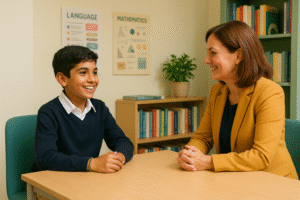
11+ Weekly Study Timetable: How to Plan Effective Revision at Home
11+ Weekly Study Timetable: How to Plan Effective Revision at Home
By Reena Damani, Founder of Academic Success
As a mum of two and an experienced educator with over 20 years in the field, I know firsthand how overwhelming the 11+ preparation journey can feel. You’re juggling work, family life, and suddenly you’re expected to become an expert in Verbal Reasoning, Non-Verbal Reasoning, and everything in between. Take a deep breath – you’ve got this, and I’m here to help.
The key to successful 11+ preparation isn’t cramming or stressing your child (or yourself!) into exhaustion. It’s about creating a sustainable, balanced approach that builds confidence alongside knowledge. Today, I’m sharing a practical weekly study timetable that hundreds of families have used to navigate their 11+ journey successfully.
Why Structure Matters (But Flexibility is Key)

Before we dive into the timetable, let’s address the elephant in the room: every child is different. What works for your neighbour’s child might not work for yours, and that’s perfectly normal. The beauty of a structured timetable is that it provides a framework you can adapt to your family’s unique needs.
I’ve seen too many families burn out trying to follow rigid schedules that don’t account for school plays, swimming lessons, or simply having a bad day. Remember, we’re building lifelong learning habits, not just preparing for one exam.
The Complete 11+ Study Areas: Your Roadmap to Success
Let’s break down what your child needs to master:
Core Subjects:
- Verbal Reasoning – Pattern recognition with words, vocabulary, and logical thinking
- Non-Verbal Reasoning – Visual puzzles, spatial awareness, and pattern spotting
- English – Reading comprehension, grammar, spelling, and creative writing
- Mathematics – Arithmetic, problem-solving, and mathematical reasoning
Additional Areas (depending on your target schools):
- Creative Writing – Storytelling, descriptive writing, and narrative skills
- Interview Preparation – Confidence building, communication skills, and school-specific practice
- General Knowledge – Current affairs, cultural awareness, and broader learning
- Science – Some schools include basic scientific concepts and reasoning
Your Weekly 11+ Study Timetable Template

Here’s a realistic weekly structure that balances thorough preparation with your child’s wellbeing:
Monday – Maths Monday
- Duration: 45-60 minutes
- Focus: Mathematical reasoning and problem-solving
- Activities:
- 20 minutes: Core arithmetic practice
- 25 minutes: Word problems and mathematical reasoning
- 15 minutes: Quick mental maths games
- Parent Tip: Keep a calculator handy to check answers together, but encourage mental calculation first
Tuesday – Verbal Reasoning Victory
- Duration: 45-60 minutes
- Focus: Vocabulary building and verbal logic
- Activities:
- 15 minutes: Vocabulary expansion (new words, synonyms, antonyms)
- 30 minutes: Verbal reasoning practice papers
- 15 minutes: Reading comprehension passage
- Parent Tip: Create a family word of the day and use it in conversation
Wednesday – Writing Wednesday
- Duration: 45-60 minutes
- Focus: English skills and creative writing
- Activities:
- 20 minutes: Grammar and punctuation exercises
- 25 minutes: Creative writing practice (stories, descriptions)
- 15 minutes: Reading aloud together
- Parent Tip: Ask your child to read their writing to you – it helps them spot errors naturally
Thursday – Thinking Thursday (Non-Verbal Reasoning)
- Duration: 45-60 minutes
- Focus: Visual puzzles and spatial reasoning
- Activities:
- 30 minutes: Non-verbal reasoning practice
- 15 minutes: Pattern games (Sudoku, logic puzzles)
- 15 minutes: Drawing exercises to improve spatial awareness
- Parent Tip: These can be fun family activities – everyone can join in with pattern games
Friday – Foundation Friday
- Duration: 45-60 minutes
- Focus: Revision and consolidation
- Activities:
- 30 minutes: Review the week’s work
- 15 minutes: Address any areas of difficulty
- 15 minutes: Quick-fire practice across all subjects
- Parent Tip: Friday is perfect for celebrating the week’s achievements
Saturday – Skills Saturday
- Duration: 60-90 minutes (can be split across the day)
- Focus: Additional skills and enrichment
- Activities:
- 30 minutes: General knowledge and current affairs
- 30 minutes: Interview practice or presentation skills
- 30 minutes: Science concepts (if required by target schools)
- Parent Tip: Make this interactive – discuss news stories, practice conversations, conduct simple experiments
Sunday – Rest and Reflect
- Duration: Light activities only
- Focus: Consolidation and family time
- Activities:
- 20 minutes: Light reading for pleasure
- 10 minutes: Week’s reflection and planning ahead
- Plenty of time for family activities and rest
- Parent Tip: Sunday is about recharging. Avoid intensive study – mental rest is crucial for retention
Making It Work for Your Family
Timing Flexibility
These time slots are suggestions. If your child focuses better in the morning, shift the schedule. If evenings work better after school, adapt accordingly. The key is consistency, not rigid timing.
Age Adaptations
- Year 4 students: Start with 30-minute sessions
- Year 5 students: Use the full 45-60 minute sessions
- Year 6 students: Consider extending to 60-75 minutes for intensive periods
Managing Overwhelm
If your child seems stressed or resistant:
- Reduce session length by 15 minutes
- Increase praise and encouragement
- Take regular breaks within sessions
- Consider whether the material is too advanced
The Academic Success Approach: Building Confidence
At Academic Success, we’ve learned that children perform best when they feel supported, not pressured. Here’s how to maintain a positive atmosphere:
Celebrate Small Wins: Acknowledge improvement, not just perfect scores. “You solved three more problems correctly today!” is more motivating than focusing on mistakes.
Create a Learning Environment: Designate a quiet, well-lit study space with minimal distractions. Keep all materials organised and easily accessible.
Be Patient with Progress: Some concepts take time to click. If your child struggles with verbal reasoning today, they might have a breakthrough tomorrow.
Maintain Perspective: The 11+ is important, but it’s not everything. Your child’s wellbeing and love of learning matter more than any single test score.
Red Flags to Watch For
Sometimes, despite our best intentions, things don’t go according to plan. Here are warning signs that you might need to adjust your approach:
- Your child becomes tearful or anxious about study time
- Academic performance drops in other school subjects
- Sleep patterns or appetite change significantly
- Your child expresses feeling overwhelmed or “stupid”
- Family relationships become strained around study time
If you notice any of these signs, take a step back. Reduce the intensity, seek support, and remember that your child’s mental health is the priority.
Resources and Tools for Success
Recommended Materials:
- Age-appropriate 11+ practice books for each subject area (CGP 11+ Books)
- Timer for managing study sessions (Pomodoro Timer)
- Highlighters for marking important information
- Notebook for tracking progress and vocabulary
- Access to online practice platforms (11+ Papers)
Free Resources:
- Local library 11+ sections
- BBC Bitesize KS2 for additional practice
- First News for current affairs (child-friendly versions)
- Natural History Museum online resources for general knowledge
- Khan Academy Kids for interactive learning
When to Seek Additional Support:
- If your child consistently struggles despite regular practice
- When you feel out of your depth with certain subject areas
- If school performance begins to suffer
- When family stress levels become unmanageable
Sample Weekly Progress Tracker
| Day | Subject | Time Spent | Achievements | Areas to Improve | Mood Rating (1-5) |
| Monday | Maths | 45 mins | Fractions breakthrough | Word problems | 4 |
| Tuesday | Verbal Reasoning | 50 mins | 8/10 on synonyms | Analogies | 3 |
| Wednesday | Writing | 60 mins | Great story opening | Paragraph structure | 5 |
| Thursday | Non-Verbal | 45 mins | Pattern sequences | 3D shapes | 4 |
| Friday | Review | 40 mins | Confident with week’s work | Time management | 4 |
| Saturday | Additional Skills | 70 mins | Current affairs discussion | Interview nerves | 3 |
| Sunday | Rest | 20 mins | Enjoyed reading | – | 5 |
Final Thoughts: You’re Doing Great
Remember, as parents, you’re not expected to be teaching experts. Your role is to provide structure, encouragement, and emotional support. There will be days when nothing goes according to plan, when your child refuses to cooperate, or when you question whether you’re doing enough.
These moments are normal. What matters is that you keep showing up, keep supporting your child, and keep believing in their potential. The 11+ journey is as much about building resilience and work habits as it is about academic achievement.
At Academic Success, we’ve guided hundreds of families through this process. Some children sail through; others need more time and support. But every child who approaches their learning with curiosity and determination develops valuable skills that extend far beyond any entrance exam.
Your child is lucky to have a parent who cares enough to seek out guidance and create structure for their learning. Trust the process, trust your instincts, and most importantly, trust your child’s ability to grow and succeed.
📚 Related Resources
Helpful External Links:
- 11+ Forum Community – Connect with other parents
- Grammar School Statistics – Official data
- The Good Schools Guide – School research
Social Media & Updates:
Need personalised support for your 11+ journey? At Academic Success, we understand that every child’s path is unique. Our experienced team of qualified teachers provides tailored tuition that builds confidence alongside academic skills. Contact us today to discover how we can support your family’s success story.
About the Author: Reena Damani is the founder of Academic Success, a mum of two, and an experienced educator with over 20 years of helping children reach their potential. She specialises in creating nurturing learning environments where children build both academic skills and lifelong confidence.



